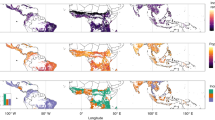Abstract
The single most promising legal and political opportunity for simultaneously preserving tropical forests and combating climate change in the near future is the developing REDD+ mechanism (for summaries of REDD+ proposals see Parker et al. 2009). REDD+ has been understood primarily, if not exclusively, as a mitigation mechanism by most commentators because it has the potential to significantly reduce the nearly 20 % of global greenhouse gas emissions attributable to the forest and land use sector. However, as REDD+ becomes established, it will inevitably have a significant impact on adaptation in tropical forest regions. This impact will not necessarily be beneficial, but design choices made now—in the early stages of REDD+ development—can shape the mechanism to become a profoundly valuable instrument for advancing adaptation in tropical forest countries (for in-depth discussion see Long 2011; for a discussion focusing on biodiversity benefits see Long 2009). This chapter discusses the options for designing REDD+ to maximize adaptation benefit while retaining its mitigation value.
Access this chapter
Tax calculation will be finalised at checkout
Purchases are for personal use only
Similar content being viewed by others
References
Badiozamani G (2007) Addressing deforestation and forest degradation through international policy. In: Freer-Smith P, Broadmeadow M, Lynch J (eds) Forestry and climate change. CABI, Wallingford, pp 197–206
Broadhead J, Durst P, Brown C (2009) Climate change: will it change how we manage forests? EFTRN News 50:57–65
Bronsteen J, Buccafusco C, Masur J (2010) Well-being analysis. Georgetown Law J 98:1583–1642
Butler RA, Laurance W (2008) New strategies for conserving tropical forests. Trends Ecol Evol 23:469–472
Ebeling J, Yasue M (2008) Generating carbon finance through avoided deforestation and its potention to create climactic, conservation and human development benefits. Philos Trans R Soc 363:1920–1924
Eliasch J (2008) Climate change: financing global forests. UK Office of Climate Change
Food & Agricultural Organization of the United Nations (2009) State of the world’s forests 2009
Glück P, Rayner J, Berghäll O, Braatz S, Robledo C, Wreford A (2009) Governance and policies for adaptation. In: Seppälä R, Buck A, Katila P (eds) Adaptation of forests and people to climate change: a global assessment report. International Union of Forest Research Organizations, Vienna, pp 187–210
Innes J, Joyce L, Kellomäki S, Louman B, Ogden A, Parrotta J, Thompson I, Ayres M, Ong C, Santoso H, Sohngen B, Wreford A (2009) Management for adaptation. In: Seppälä R, Buck A, Katila P (eds) Adaptation of forests and people to climate change: a global assessment report. International Union of Forest Research Organizations, Vienna, pp 135–186
Intergovernmental Panel on Climate Change (2007) Climate change 2007: synthesis report
Karousakis K (2009) Promoting biodiversity co-benefits in REDD. OECD Environment Working Papers, No. 11. OECD Publishing. doi:10.1787/220188577008
Levin K, McDermott C, Cashore B (2008) The climate regime as global forest governance: can reduced emissions from deforestation and forest degradation (REDD) initiatives pass a ‘dual effectiveness’ test? Int Forestry Rev 10(3):538–549
Long A (2011) Global climate governance to enhance biodiversity and well-being: integrating non-state networks and public international law in tropical forests. Environ Law 41:95–164
Long A (2010) Tropical forest mitigation projects and sustainable development: designing U.S. law for a supportive role. William Mitchell Law Rev 36:101–124
Long A (2009) Taking adaptation value seriously: designing REDD to protect biodiversity. Carbon Climate Law Rev 3:314–323
Parker C, Mitchell A, Trivedi M, Mardas N (2009) The little REDD+ book: an up-dated guide to governmental and non-governmental proposals for reducing emissions from deforestation and degradation. Global Canopy Program, Oxford
Sangster M, Dudley M (2007) Governance and climate change. In: Freer-Smith P, Broadmeadow M, Lynch J (eds) Forestry and climate change. CABI, Wallingford, pp 214–217
Secretariat of the Convention on Biological Diversity (2010) Global biodiversity outlook 3
Stern N (2007) The economics of climate change: the Stern review. Cambridge University Press, New York
United Nations Framework Convention on Climate Change—Subsidiary Body for Scientific and Technological Advice (2005) Reducing emissions from deforestation in developing countries: approaches to stimulate action, submissions from parties. UN Doc. FCCC/CP/2005/MISC.1
United Nations Framework Convention on Climate Change (2008) Bali, Dec. 3–15, 2007, part two: action taken by the conference of the parties at its thirteenth session. U.N. Doc. FCCC/CP/2007/6/Add.1
United Nations Framework Convention on Climate Change—Ad Hoc Working Group on Long-Term Cooperative Action Under the Convention (2009) Copenhagen, Dec. 7–15, 2009, Policy Approaches and Positive Incentives on Issues Relating to Reducing Emissions from Deforestation and Forest Degradation in Developing Countries; and the Role of Conservation, Sustainable Management of Forests and Enhancement of Forest Carbon Stocks in Developing Countries, Draft Decision (addendum). U.N. Doc. FCCC/AWGLCA/2009/L.7/Add.6
United Nations Framework Convention on Climate Change (2010) Cancun, Nov. 29–Dec. 10, 2010, The Cancun Agreements: Outcome of the Work of the Ad Hoc Working Group on Long-term Cooperative Action under the Convention. U.N. Doc. FCCC/CP/2010/7/Add.1
United Nations Framework Convention on Climate Change (2011) Durban, Nov. 28–Dec. 9, 2011, Guidance on Systems for Providing Information on how Safeguards are Addressed and Respected and Modalities Relating to Forest Reference Emission Levels and Forest Reference Levels as Referred to in Decision. U.N. Doc. FCCC/CP/2011/9/Add.2
Vandenbergh M, Ackerly B, Forster F (2009) Micro-offsets and macro-transformation: an inconvenient view of climate change justice. Harvard Environ Law Rev 33:303–348
Yamin F, Depledge J (2004) The international climate change regime: a guide to rules, institutions, and procedures. Cambridge University Press, Cambridge
Author information
Authors and Affiliations
Corresponding author
Editor information
Editors and Affiliations
Rights and permissions
Copyright information
© 2014 Springer-Verlag Berlin Heidelberg
About this chapter
Cite this chapter
Long, A. (2014). Advancing Forest-Related Adaptation: Options for Adaptation-Oriented REDD+. In: Albrecht, E., Schmidt, M., Mißler-Behr, M., Spyra, S. (eds) Implementing Adaptation Strategies by Legal, Economic and Planning Instruments on Climate Change. Environmental Protection in the European Union, vol 4. Springer, Berlin, Heidelberg. https://doi.org/10.1007/978-3-540-77614-7_2
Download citation
DOI: https://doi.org/10.1007/978-3-540-77614-7_2
Published:
Publisher Name: Springer, Berlin, Heidelberg
Print ISBN: 978-3-540-77613-0
Online ISBN: 978-3-540-77614-7
eBook Packages: Earth and Environmental ScienceEarth and Environmental Science (R0)




